


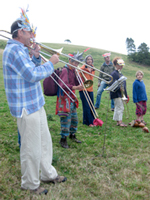 musical migrations
musical migrationsWe hope that by reading and listening to what we have done, you'll be inspired to set out on your own Musical Migrations, listening to birdsongs in your local area, and maybe even creating some of your own tunes and stories or pictures...

One brave group went on a dawn chorus walk in May, listening to the birds on the Offa's Dyke path just down from the Offa's Dyke Centre in Knighton. Which bird started singing first?
listen to the dawn chorus.
What is this bird that sings so loudly, but is very small, and features in the story The King of the Birds?
_________________________
Amy Douglas told members of Knighton Lunch Club the following moving story:
Story: Old Tom and Death
Tom had always loved the birds. All through his life, he had listened to their song and had their company as he worked.
Now Tom was an old man and his working days were past. But still he loved the birds. Each day he put food out for the birds to eat. Each morning he took his morning cup of tea, sat on the bench in the garden and watched them forage, court their partners and raise their chicks.
One autumn day, Tom took his tea out as usual, but his hands shook as he held his mug. He shivered and his head ached. Soon he made his way back inside, up the stairs and into bed. He felt worse as the day went on. As dusk came and the shadows lengthened, a dark figure stood in the doorway. Tom looked up and saw Death coming to take him.
'No, not now! You can't take me now!'
Death hesitated. 'But why? Your wife is waiting. You have had a long life. It's time. Come with me.'
'It's the birds. It's autumn. They expect me to be here to help them through the winter. If you come back in the spring, they will have all the spring and summer to prepare for the winter, but if I leave them now, they will starve.'
There was a pause.
'Very well, Tom. I will ask you three questions. If you can answer those questions you can have until the spring. And the first question is this: when you were five, your mother baked you a birthday cake. What sort of cake was it? I'll be back tomorrow for the answer.'
There was a draft of cold air and Death was gone. Tom cast his mind back a lifetime. He remembered the warmth of his mother's kitchen, the smell of baking, the excitement of the birthday. But try as he might, he could not remember the taste of the cake.
The next morning, Tom made his cup of tea and took it outside to sit on the bench. He looked around his garden at all the birds gathered there.
'I'm sorry, I've let you down. I can't remember the cake. It's going to be a hard winter and I'm afraid you'll have to fend for yourselves.'
It seemed to him that the birds sang even sweeter than usual that morning. They came fluttering down and hopping over the grass. At last, Tom, heard the words in the song.
'Cherry cake! Cherry cake! Cherry cake!'
Cherry cake - of course! That was the cake. How could he have forgotten?!
That night he went to bed early, but he didn't sleep. He was waiting as he felt a breath of cold air on his cheek. He sat up in the bed and looked at Death with a smile on his face.
'It was a cherry cake' Slowly Death nodded his head.
'But there are still two questions to answer. And the next is this. When you were three, your father came home from the wars and your mother made biscuits to welcome him. What biscuits were they?'
With a whirl of his cloak, Death was gone.
Tom couldn't remember, but this time he didn't worry, put his head down and slept.
The next morning, he took out his tea, sat on the bench and looked around the garden expectantly. The birds didn't let him down. They gathered around him, chirruping,
'Ginger biscuits! Ginger biscuits! Ginger biscuits!'
When Death came that night,Tom was sat up waiting for him.
'They were ginger biscuits.'
'Yes they were, Tom. But there is still one more question. When you were born and put into your Father's arms for the first time, what did he say?'
Well of course Tom couldn't remember, but he put his trust in the birds once again.
He took his cup of tea out in the morning and looked around at the birds. But that morning the birds were silent. They looked down at him from the bushes and tress, but didn't come any closer. The morning that Tom had been born, it had been raining and all the windows were shut. The birds did not know the answer.
Tom looked at the silent birds.
'Take care of yourselves through the winter. I'm sorry I won't be here to help you through the cold months.'
With that, Tom heaved himself up from the bench and made his way inside. He wasn't feeling well. He took to his bed. His temperature rose as the day wore on, until the cool draft of Death's entrance was balm against his cheek. In his fever, he looked toward the figure in the doorway, no knowledge of who it was, but thinking instead of his last pleasure, the one thing that might ease his soul.
'Please. Please, would you open the window and let me hear the birds sing'
Death looked down at Tom.
'I'll be back for you in the Spring.'
After the story members of the Lunch Club listened to recordings made locally of different birdsongs and then noted down the songs that they used to hear and what has changed, which are less frequently heard now. Here are some of the things they noted:
Cuckoos used to be heard everywhere but are now very rare. Swifts still visit but do not always go to the same areas. The mistle thrush used to be more common.
On the plus side there are more buzzards and red kites and we still catch glimpses of the kingfisher along the River Teme.
Project: Listening to birdsong
About thirty members of two Knighton mental health users groups attended a music workshop, listening to birdsongs and learning basic group improvisation techniques.
Here are some of the birdsongs we listened to...can you recognise them? (answers at end)
listen to bird A:
bird B:
bird C:
bird D:
bird E:
bird F:
bird G:
bird H:
bird I:
Project: Bucknell School
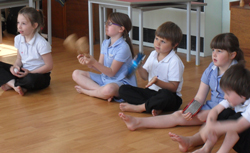 .......
.......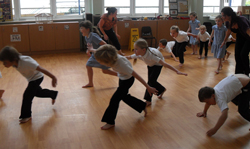
Over the Summer Term, children from Key Stage 1 at Bucknell School devised a performance piece, The Swallows' Tale, using music, dance and masks, based on the story of migrating swallows. We did a bird walk outside and then tried to sing the sounds that we heard - the most prominent being the chiffchaff.
listen to the chiffchaff
They composed a song, based on notes picked out individually by all the children and wrote their own stories about the swallow's migration
listen to the song
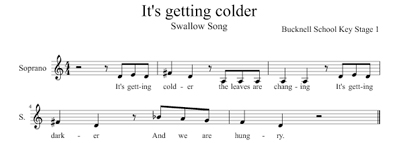
Two of the swallow stories can be downloaded here
Ayisha's story ... Jason's story
The children also devised their own Dawn Chorus.
The Dawn Chorus improvisation is an exercise in listening as much as singing or playing.
Imagine it's Spring, just before dawn one fine morning. While it's still dark, the first bird starts to sing (often a blackbird.) Then there's a pause and then another replies.Gradually there are fewer and fewer pauses and more and more overlaps, until finally the whole dawn chorus is going at full volme and all the birds seem to be singing at once. Then gradually, they all drop out again and there is silence (or almost silence). Here's the last part of a Dawn Chorus from one of the Mainstone workshops.
listen to the dawn chorus improvisation
and also a short round called Hello I'm here

We did two chants based on African names of swallows:
Inkonjani, the Lightning Bird, the Breaker of Cliffs, the bird that brings the rain and Intaka Zomzi, bird of the home.
The performance took place at the school on Sept 22nd, and was a great success. The children had practised both music and dancing extremely hard, working with dancer Amy Burns, and musicians Nick Dummer and Camilla Saunders.Other local musicians joined in at the final performance.
The performance was followed by a talk by Anne Cummings, who is working collecting data for the Bird Atlas, produced by the British Trust for Ornithology.
The evening ended with a story- telling by Amy Douglas - The King of the Birds - with all the children joining in.
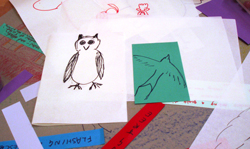 ...
...
During two weeks in August, workshops in story telling, music and mask making took place first in Knighton (Offa's Dyke Centre) and then in Mainstone Village Hall. Each week of workshops culminated in a performance, based on the story Vengeance will Come.
Story: Vengeance will come
There was once a great lord. He owned land as far as the eye could see in every direction.His fields were rich and fertile and kept his store houses full. Still, he wanted more. There was one piece of land that, although it belonged to him in name, was never farmed and was left alone by all his subjects. A rolling green hill, the grass thick and lush. It drew his eyes to it and worried away at him like grit in an oyster. The people said it belonged to the fair folk, that it was bad luck to go near it. The lord had had enough. He called his men, told them to bring their horses and ploughs and to meet him at the green hill. The men came, but they would not step onto to that lush green grass. They stood silently staring at the green hill and would not go further. The lord was furious. He grabbbed a spade, strode onto the beautiful grass and sliced the cold iron into the ground. The silence intensified as the men watched to see what would happen. Nothing did.
'See!' cried the lord, 'There is nothing here but superstition and good land going to waste.'
At last the men were more frightened of their lord than the stepping onto the hill. The ploughs churned up the lush grass until the green hill turned brown.
At last, when all was finished and the lord and his men made ready to go, a voice spoke,
Vengeance will come
The lord laughed and claimed it was nothing but the wind.
Vengeance will come ,the voice spoke louder
This time the lord could not deny he heard it too. His voice trembled as he asked,
'When? When will it come?'
Vengeance will come in the seventh generation
Then the lord threw back his head and laughed.
'The seventh generation?! I will be long dead and in my grave by then. Let it come, I will know nothing about it.'
The years and generations passed, but the lord did not die. His children had children, who had children in their turn, until at last the lordŐs great great great great grandchild was born.
To celebrate the birth the lord held a great party with all his descendents gathered around him. A huge banquet was prepared. Entertainers were invited from far and near.
The party was in full swing when one of the musicians put down his harp to rest his fingers and find something to eat. A little brown bird landed by his feet, looked up at him with bright eyes and chirped. The bird flew to the door, perched above it and looked back at the harper. Intrigued, the harper followed. The bird led him outside, through the stables and outhouses, across the fields and up into the hills. The music and conversation of the party faded away behind them. After a while the harper began to feel foolish, allowing himself to be led all over the countryside by a little brown bird. He'd left his harp, a good meal and a night's work behind him. He turned to go back, but he realised he was lost in the night. He turned back to follow the bird once more, but the bird had flown. There was nothing for it but for him to lie down and sleep where he was and to sort matters out in the morning.
The harper woke with the sun on his face. He stretched and stood up to get his bearings and find his way back. But where the hall had been the night before, now, sparkling in the sunshine, was a great lake. The hall, the lord, all the people were gone. Astonished, the harper walked down to the edge of the lake.
The harper heard a whistling on the air. He looked up to see the air full of birds. From all directions they came: swans, ducks, geese, all kinds of waterfowl. They circled above the lake then landed on the water. A little flotilla of birds swam towards him, pushing something in front of them. As they came closer, the harper saw it was his harp. At last it was close enough for him to reclaim.
The harper bowed his head to the birds.
'Thank you.'
The harper took his harp in his arms and began to play. The music mingled with the voices of the birds and something else, a bittersweet melody that came from the hill behind him.
Attendance at the workshops was patchy but in the end, over the whole fortnight about fifty people joined in, either as performers, workshop participants or audience. Not all workshop participants took part in the performance, but everybody contributed something, either a picture, a story or an idea.
Art work done in the workshops was hung from trees along with poems and photographs, information about bird populations, and the effects of climate change on wildlife.
performance of jackdaw piece
download score of jackdaw music
performance of swan piece
The last event of Musical Migrations was a concert of mainly improvised music in Knighton Church Hall. The audience was attentive and appreciative.
 ...
...










